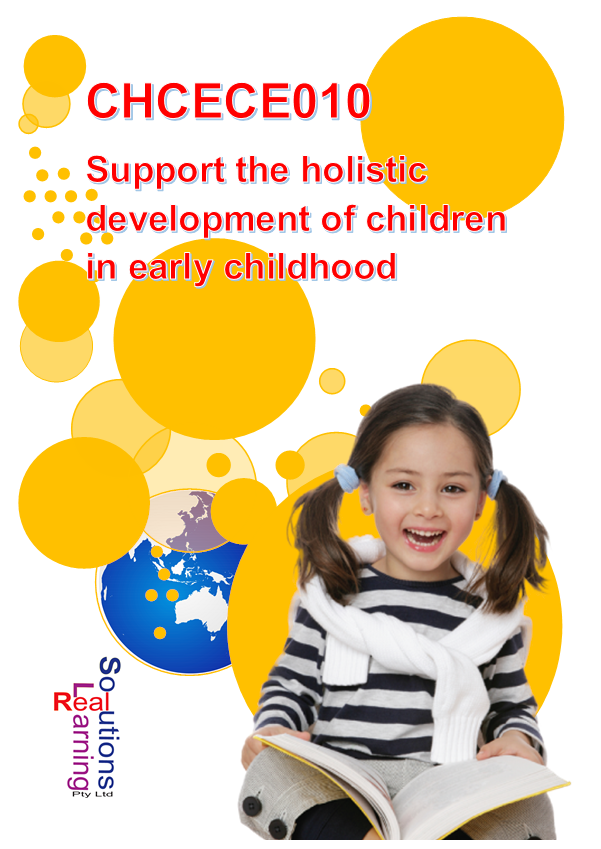CHCECE010 - Support the holistic development of children in early childhood (Release 2)
SKU:
CHCECE010
A$495.00
A$495.00
Unavailable
per item
$544.50 inc GST - GST will be charged on checkout
This unit describes the skills and knowledge to support and recognise the interrelationship between the physical, social, emotional, cognitive and communication development of children from birth to 6 years of age.
This unit applies to educators working in a range of early childhood education and care services.
No licensing, legislative or certification requirements apply to this unit at the time of publication
What we give you in the package:
Our package is delivered to you in CD (electronic) format, our materials contain references and links to topical literature and MS Word documents; including
Our resources are able to be contextualised and replicated as you see fit.
Our licence allows you to reprint, badge, remove, and add materials to your specifications – if you feel it necessary.
Our resources still offer you the breadth, depth and complexity of knowledge and competencies covering selecting, adapting and transferring skills and knowledge to new environments.
Our resources still provide you with the technical advice and early leadership skills for problem resolution.
The licence allows for use online
This unit describes the skills and knowledge to support and recognise the interrelationship between the physical, social, emotional, cognitive and communication development of children from birth to 6 years of age.
This unit applies to educators working in a range of early childhood education and care services.
No licensing, legislative or certification requirements apply to this unit at the time of publication
What we give you in the package:
Our package is delivered to you in CD (electronic) format, our materials contain references and links to topical literature and MS Word documents; including
- comprehensive candidate’s workbooks;
- candidate’s assessment tools;
- trainer’s marking guides;
- PowerPoint presentation/s;
- competency assessment mapping against:
o performance criteria;
o foundation skills;
o performance evidence;
o knowledge evidence.
Our resources are able to be contextualised and replicated as you see fit.
Our licence allows you to reprint, badge, remove, and add materials to your specifications – if you feel it necessary.
Our resources still offer you the breadth, depth and complexity of knowledge and competencies covering selecting, adapting and transferring skills and knowledge to new environments.
Our resources still provide you with the technical advice and early leadership skills for problem resolution.
The licence allows for use online
Performance EvidenceThe candidate must show evidence of the ability to complete tasks outlined in elements and performance criteria of this unit, manage tasks and manage contingencies in the context of the job role. There must be demonstrated evidence that the candidate has completed the following tasks at least once:
The candidate must be able to demonstrate essential knowledge required to effectively do the task outlined in elements and performance criteria of this unit, manage the task and manage contingencies in the context of the work role. These include knowledge of:
Skills must be demonstrated in a regulated education and care service.
In addition, simulations and scenarios must be used where the full range of contexts and situations cannot be provided in the workplace or may occur only rarely. These are situations relating to emergency or unplanned procedures where assessment in these circumstances would be unsafe or is impractical.
Simulated assessment environments must simulate the real-life working environment where these skills and knowledge would be performed, with all the relevant equipment and resources of that working environment.
Assessment must ensure use of:
- supported the development of children in at least three different situations/activities (including different age groups and abilities), including:
- interacting with children to holistically support development and learning appropriate to the child’s abilities and age
- providing a variety of experiences and environments to support the different areas of children’s development (including a combination of physical, creative, social, emotional , language and cognitive)
- performed the activities outlined in the performance criteria of this unit during a period of at least 120 hours of work in at least one regulated education and care service.
The candidate must be able to demonstrate essential knowledge required to effectively do the task outlined in elements and performance criteria of this unit, manage the task and manage contingencies in the context of the work role. These include knowledge of:
- code of ethics
- United Nations Convention on the Rights of the Child
- how to access:
- the National Quality Framework
- the National Quality Standards
- the relevant approved learning framework
- and how to navigate through framework and standards documents to find areas relevant to this unit of competency
- introductory-level child development for children, including:
- early brain development
- importance of the early years for subsequent educational success
- foundational knowledge of developmental theory
- aspects of poor early childhood development, such as:
- poor diet
- lack of play
- limited stimulation of brain development
- lack of materials and resources
- inconsistent or non-existent emotional support or comfort
- trauma
- other life experiences which interrupt appropriate childhood activities, and their potential long-term harmful impacts
- biological and environmental influences on development
- symbol systems including letters, numbers, time, money and musical notation.
Skills must be demonstrated in a regulated education and care service.
In addition, simulations and scenarios must be used where the full range of contexts and situations cannot be provided in the workplace or may occur only rarely. These are situations relating to emergency or unplanned procedures where assessment in these circumstances would be unsafe or is impractical.
Simulated assessment environments must simulate the real-life working environment where these skills and knowledge would be performed, with all the relevant equipment and resources of that working environment.
Assessment must ensure use of:
- National Quality Framework for Early Childhood Education and Care
- the relevant approved learning framework under the National Quality Framework for Early Childhood Education and Care.
